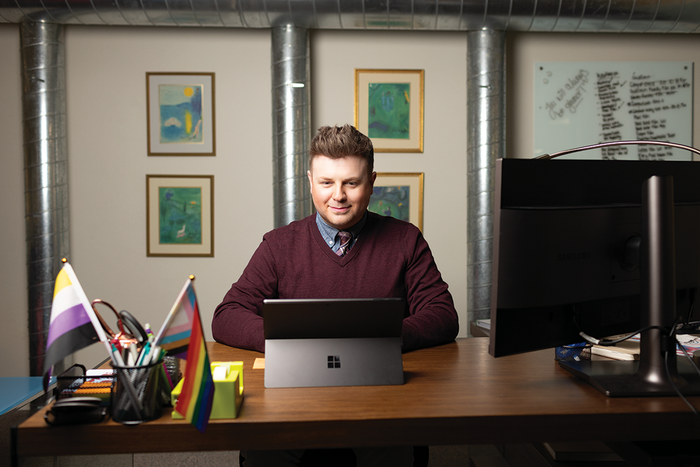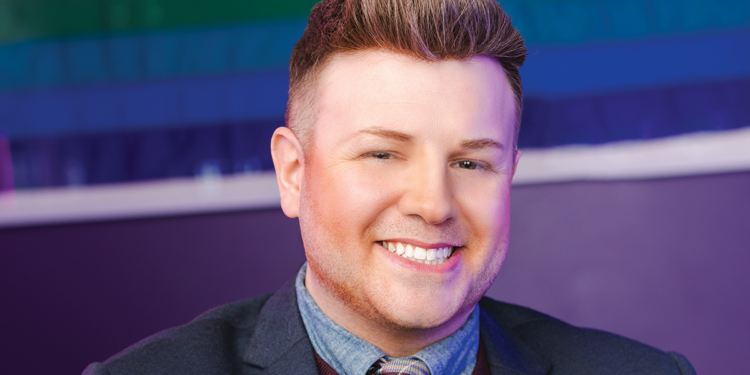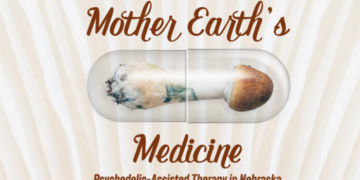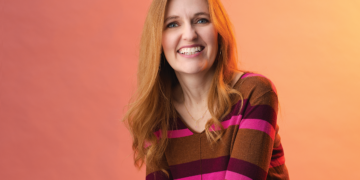Listen to this article here. Audio Provided by Radio Talking Book Service.
When the Omaha ForUs LGBTQ+ resource center opened on July 17 last year, it realized the efforts of many to fill a service void in the community, but for none more so than veteran equity warrior JohnCarl Denkovich, its founder and executive director.
“There had been a previous attempt at a center but to even get something off the ground is such a heavy lift,” said Denkovich, who cultivated intersections and allies in Omaha Mayor Jean Stothert and Heartland Family Service president and CEO John Jeanetta to make it happen.
An ARPA (American Rescue Plan Act) grant from Douglas County sealed the deal. “The center wouldn’t be in existence without the grant,” said Denkovich. “It funded our mental health program.”
Referring to the nonprofit organization at 3337 North 107th St., Omaha ForUs board member Eli Rigatuso, a trans activist and advocate, echoed many in saying, “This is way overdue and indeed a game changer.” Rigatuso added that Denkovich is uniquely qualified to lead the way due to their groundwork building bridges, making connections, and leveraging relationships.
“It’s not like this happened in a vacuum,” Rigatuso said. “JohnCarl has been involved in some pretty instrumental things. Their policy [and] advocacy legwork culminated in making the center a reality.”
And none too soon.
“Before we opened, we were one of seven of the country’s top 50 cities without a center,” Denkovich said. “The Midwest is very underfunded as far as LGBTQ initiatives go. Our core service area is eastern Nebraska and western Iowa, but it has become more than that very quickly. As the only center between Chicago and Denver, from east to west—and between Sioux Falls, South Dakota, and Kansas City, from north to south—we get calls from a large area.”
Amanda Crichlow Silva, who’s worked with Denkovich on trans-inclusive policies, saw her colleague bring passion and dedication to creating a city culture that goes beyond advisory boards. “JohnCarl knew that impact was not enough until we had a safe and inclusive physical space for our community.”
Denkovich became “so invested” in bringing long-held hopes for a center to fruition, they said, “because of lack of resources for our community.”
“I knew I had some connections, and I was hoping we could find others to make it happen–it was just too important to let anything stop us from doing it.”
Denkovich acknowledges “standing on the shoulders” of many who worked behind the scenes in the LGBTQ equity space. The center is their shared legacy.
Not having a facility cost the state dearly.
“Most centers are the central hubs in their cities that build community, deliver health access, and provide funding opportunities and pipelines for jobs and skilled training,” Denkovich said. “By not having it here, it showed up in our outmigration and brain drain, which is huge among 18- to 34-year-olds and much more magnified yet in the LGBTQ community.
“It manifests in a lack of health resources and the larger magnitude of lives lost. The science is very clear. There are disparate health outcomes in marginalized communities, especially LGBTQ people,” they said. “In the needs assessment we did, one in three did not see a physician in the last year due to cost. Fifty percent had seriously considered suicide at one point. Four in five had serious mental health concerns.”
Culturally responsive mental health services are at the core of Omaha ForUs, which also operates a clothes closet and choice food pantry.
“I knew we couldn’t have a center without a public health approach,” Denkovich explained. “If we’re not meeting people where they’re at, and we're throwing dollars at other things instead of trying to solve some of the most obvious misses in our community, then we're not taking care of our people the way we should from an economic and a humanity standpoint.”
In light of anti-LGBTQ policies and rhetoric getting traction, Denkovich said, there was greater urgency to get a center up and running.
“What I usually ask is if you can’t be an advocate, don’t be an obstacle,” Denkovich said.
A lack of safe, enriching, engaging spaces added to the pressing need.
“We didn’t have any way in Omaha to build community among LGBTQ people specifically except for bars and maybe high school clubs,” Denkovich explained. “The shelf life is very short for bar culture. If you’re not of age or you’re sober or you don’t like the bar scene, it’s very difficult to cultivate any culture. There are social support systems on campuses but a lot focus on advocacy and activism, which is important, but that’s not everybody’s path.”
Denkovich’s own sense of agency has always been building toward this moment.
“From an early age, I had service to community instilled in me. I became sort of an accidental activist and fell into this type of work.”
The Lincoln native suffered high school bullying and considered leaving a then-hostile Hastings College until deciding to become the change.
“My mother used the analogy of being the stone that creates the ripples in a pond. You have to start small. It may not change overnight. It’s looking for progress over perfection and not letting perfection be the enemy of good. I took some time, came home, and went back and joined everything on campus. I helped form The Alliance, an LGBTQ group that met secretly. That was really the tipping point for how I fell into it.”
Denkovich took advocacy and activism to new heights by documenting anti-LGBTQ incidents on campus and sharing that data with the college president, who acted on the findings.
“It all happened very quickly. By the time I graduated, I was nominated and selected for Who’s Who of Hastings College.”
The experience was the first in a string of social justice actions and recognitions that followed.
“I really fell into this first for myself and then stayed in it for others. It’s hard for me to say no to things I care about.”
Denkovich chaired the Omaha Mayor’s LGBTQ+ Advisory Board, served on the ACLU of Nebraska Trans Rights Advisory team, the GLSEN National Advisory Council, and the GLSEN Omaha Board of Directors, and founded UNO’s Student Agency of Gender & Sexual Orientation. Denkovich was also an outreach intern with Lambda Legal Defense & Education Fund. Prior to founding and leading the Omaha ForUs Center, they were director of communications and programming at Holland Children's Movement and Holland Children's Institute.
Their work has resulted in a “40 Under 40” mention from the Midlands Business Journal, a “Ten Outstanding Young Omahans" nod by the Jaycees, the Change Leader Award from Heartland Family Service, and Advocate of the Year by Heartland Pride.
“I’ve tried to cultivate a reputation for positive change.”
Advocacy and activism, Denkovich said, is “certainly an undercurrent that’s been emerging through my entire personal and professional life. There’s a time and a place for both, and we usually make each other better. It’s knowing how to meet the moment and when is the best time to stage a protest and when is the best time for diplomacy to build a place of knowledge.”
Denkovich has worked with stakeholders to create an “intentional community” rooted in collective LGBTQ-generated action.
“The people who are most affected by the problem are empowered to help solve it for themselves. As [Congresswoman] Ayanna Pressley said, ‘The closest to the pain need to be closest to the power.’ That’s a crucial part of what we wanted. There are no straight people on our board of directors for that reason. There are lots of places where straights can be allies and support our work. Being in leadership isn’t one of them.”
Some LGBTQ community partners are co-located at the center. More may follow.
An “Our Anthem” declaration of principles and values on the website was curated from interviews.
“I love the anthem, and I think it says a lot about what we do,” Denkovich said. “It gives me goosebumps every time somebody reads it aloud or reacts to it.”
Settling on the center’s name reinforced the “for us, by us, we’re nothing without us” mantra. “We say ‘for us’ a lot here and in the work we’re doing,” Denkovich said. “It felt right.”
Denkovich feels the weight of this startup but wouldn’t have it any other way.
“In this position, I feel I’m carrying a large burden in addition to being under a large looking glass because so much of what we do matters so much to so many people. If we’re not doing something well, I want the community to tell us and hold us accountable.”
“One of the biggest strengths the center has is the integrity and accountability that JohnCarl exhibits through their leadership,” Silva said.
“We’re nothing if not responsive,” Denkovich added.
So far, so good.
“We’ve been here a short time, but we’ve had great feedback. Based on the response we’ve received from people who’ve utilized the center, I don’t know where they would be if we didn’t have a center.
“What’s most interesting is when people come in looking for one thing and end up finding out the root cause may be something different or they actually need two or three things,” Denkovich said. “Folks may come in for mental health services but say, ‘I feel the need to express myself this way, and I don’t have the financial resources to clothe myself in that way.’ We can help with that.”
Denkovich knows the center must build capacity to do more, perhaps even address safe housing needs. However it grows, Denkovich is right where they want to be.
“It is one of the most meaningful things I’ve done personally, because it is so public.”
Visit omahaforus.org for more information.
This article originally appeared in the January/February 2024 issue of Omaha Magazine. To subscribe, click here.


Photo by Bill Sitzmann.











